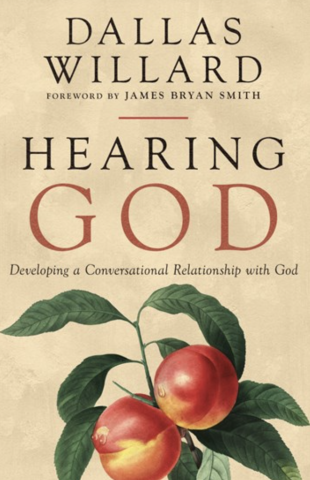Biggest Takeaways From Dallas Willard's "Hearing God"

Life is full of questions.
Do I need to join a gym? Should I break up with this guy? Which jobs should I apply for? Should I switch majors?
Like you, I long to be able to discern in uncertainty.
Discernment is a journey rooted in searching for God and responding in a direction he desires. It’s about hearing God.
Dallas Willard, who wrote the IVP classic “Hearing God” says, “God will not compete for our attention” (p. 120). If this is true, discernment doesn't strike us unexpectedly in a moment of inspiration but instead comes through working to determine where God is and what he has to say to us.
Ways To Hear From God
In chapter 5 of “Hearing God,” Willard describes ways people heard from God in Scripture. These include the personal appearance of Jesus, a physical phenomenon, a supernatural messenger or angel, dreams and visions, an audible voice, and prophets relaying words from God.
Perhaps God will choose to be heard through these means in our lives. Or maybe he’s waiting for us to pay attention to ways he’s already speaking.
Here are two overarching actions that have helped me hear God:
1. Seek community. What can be fuzzy or narrow when you discern individually can often be confirmed or clarified in community. Perhaps your Bible study group, an accountability partner, mentor, or spiritual director can help you.
2. Listen more and ask less. Our ability to hear God might change if we lean into practices of silence, solitude, and unhurried listening. The more words I say, the less space I’m giving to hear from God.
Those actions may be simple enough, but what about the challenges that come up when we’re going through major life changes or when we’re unsure if we’re really hearing from God? Willard has some more great advice.
Hearing God and Not Just My Own Desires
Willard asks a question many of us wonder: “When a word or thought comes to us — through others, the inner voice, some special experience, the Bible, or circumstances — how do we know whether it is a word from God to us?” (p. 217).
Over the course of chapter 8, Willard gives three tips to answer this question:
1. “It seems that at first we must be told that God is speaking to us and possibly even be helped to detect his voice...Without qualified help, God’s direct word will most likely remain a riddle or at best a game of theological charades.” (p. 221).
In 1 Samuel 3, the voice of God calls out to Samuel, but he assumes Eli is calling him. The third time Samuel hears the voice, Eli instructs him on how to respond to the voice. This results in a conversation between Samuel and God.
Could it be that God is already speaking to you, and you just need help recognizing his voice?
2. “Listening to God does not make our own decision-making process unnecessary. We ourselves, as well as others who come under the influence of God’s voice, are still the ones who make the decision” (p. 225-226) .
Our discernment shifts as we own both the reality that God is directing us and that we have agency to make decisions. Instead of saying things like, “God told me to break up with him,” what if we owned our decisions by saying “As I sat with God, I sensed my boyfriend and I weren’t as good of a match as I thought.”
This subtle shift acknowledges that God’s guidance is influencing your decision and that you ultimately are the one making it.
3. “The voice of God speaking in our souls also bears within itself a characteristic spirit. It is a spirit of exalted peacefulness and confidence, of joy, of sweet reasonableness and of goodwill.“ (Hearing God p 230).
In John 10, Jesus calls himself the “Good Shepherd,” and says his sheep “know the voice of the Shepherd and will never follow a stranger.” Repeated time with God ‘s voice helps us recognize it. If what we’re hearing from God isn’t marked by the factors Willard mentions, then we likely aren’t actually hearing God.

Hearing God With Big Decisions
One takeaway for me in “Hearing God” was the idea of moving from communicating with God, to communing with God, to experiencing union with God (p. 201).
I’m convinced our challenge in hearing God in big decisions is that we seek to hear from him too late in the process. Rather than seeking to hear from God about which application to submit, we wait to ask which of the two job offers to accept. Instead of asking what to bring up with a supervisor, we ask God if we should quit after a year of difficult experiences.
Here are some questions to ask when discerning big decisions:
What open or closed doors do I sense God wants me to pay attention to?
What longer-term things has God called me to and how does this decision fit with that?
Hearing God After IV
Two gifts of the college experience are 1) built-in community and 2) the space to create your own daily and weekly rhythms.
Some of my fondest memories were daily dinners with floor mates, weekly Bible studies, or organic conversations that arose over regular rhythms of basketball, workouts, or leaving my door open to friends to just pop into my dorm and shoot the breeze.
The “after IV” transition requires us to press in a little more when these gifts are no longer as available. In this season of life, here are some key questions to consider if you want to be more intentional about hearing God:
How can I be a co-creator or owner of spaces where Scripture can be experienced in community? How vulnerable will I be about my desire not just to gain information in Bible study but to hear the voice of God in my life?
What might it look like to be intentional with rhythms, like going to coffee shops, gyms, community organizations, or sub-communities at my church?
What can I do to increase my proximity to folks who are seeking to hear from God in their lives?
Tomes of historical writing, hours of amazing exposition and exhortation, and thousands of coffee shop discussions have explored the idea of hearing God’s voice. Ultimately, we have to patiently persist in this process. As James 4:8 reminds us, God comes near to those who come near to Him. He wants to be heard.






